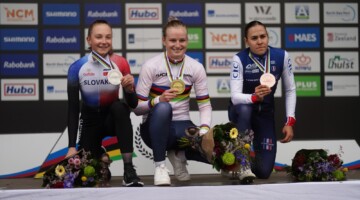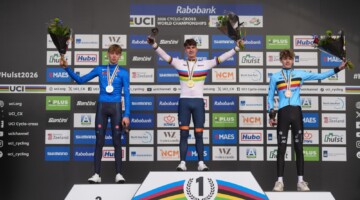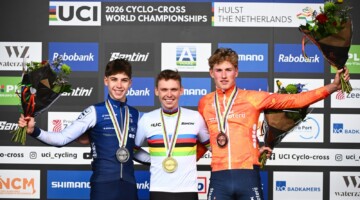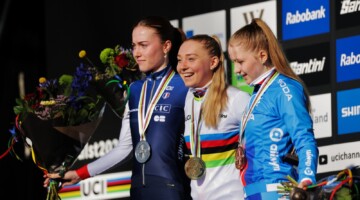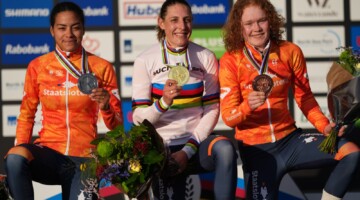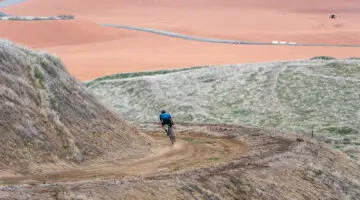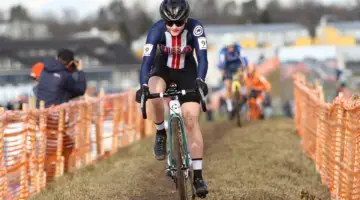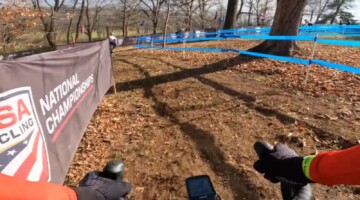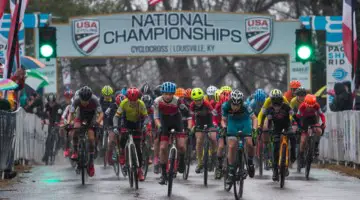On Friday, we brought you the news that USA Cycling plans to bring its Cyclocross National Championships back to December, and award Louisville and Tacoma the 2018 and 2019 (December) National Championships after the January 2018 event in Reno.
Last Thursday, Cyclocross Magazine’s Andrew Yee had the opportunity to chat with USAC’s VP of National Events Micah Rice about the [then] upcoming embargoed announcement by phone. The two discussed the long-awaited decision on the timing of Nationals, how the host cities were picked, Hartford Nationals, gate fees, losing money on the event, growing the sport and more.
See the full interview below.
Cyclocross Magazine: So, how did USA Cycling arrive at these decisions of moving back to December and selecting these cities?
Micah Rice: I think from my standpoint, the biggest story in here is obviously the move to December. We have, based on a lot of things, with the survey being one piece of the puzzle, [had] many other discussions internally, externally, within the [USA Cycling Cyclocross] Committee, even reaching out a little stronger to some under-represented groups here at USA Cycling, like the industry and things like that. There are, obviously, a lot of people in the cyclocross community and a lot of different constituents. It was not a decision we made quickly or easily, and while the survey definitely was strong toward moving it, that’s really only one group. That one was an easy one, but some of the other pieces were a lot harder.
CXM: I see. I guess while we’re talking about that topic, we saw Pete Webber, he personally was in favor of favor of the move, but was asking, because he sits on the [Cyclocross] Committee, if anyone had any reservations on the move to December. On the surface, the timing of that question seemed to me to be a bit odd, because once the survey results were in, it implied that somebody might be able to say something that could still override what the people wanted. Was there any possibility in that?
MR: Absolutely. There were some constituent groups that are very important to us that were pushing the other way. For example, when we had a conversation with the race directors here during our race directors symposium, I know a lot of the Pro CX race directors liked the January Nationals because it spread out the season a little bit and they didn’t have to fight over dates as much and things like that. There were some constituent groups that really liked the January idea. I think the Elites were split. The Masters were definitely in favor of December. In fact, even of just the Masters that attended Hartford, more than 75% said that they wanted to go to December. Those are the people that all went to the January Nationals.
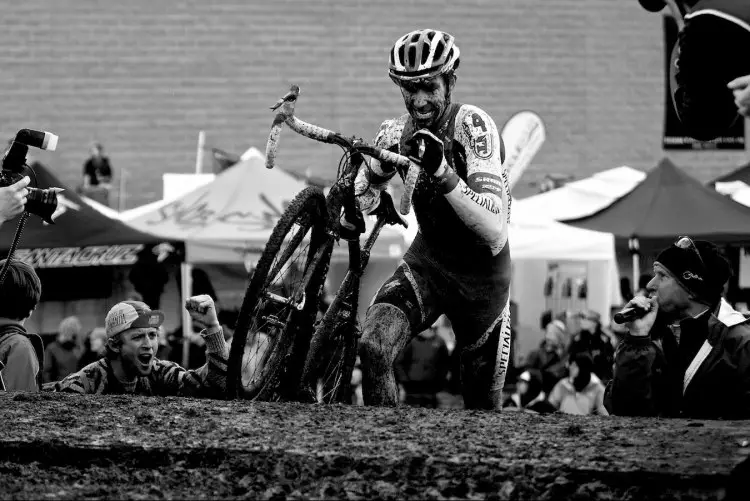
The last time we had Nationals in December was in Bend, Oregon with Todd Wells (Specialized) taking the victory. photo: Wells at the front, 2010 Nationals © Joe Sales
CXM: Right. That’s consistent with what we’ve been hearing.
MR: You’d think that would be skewed a little bit, because a lot of Masters who couldn’t make the January Nationals work, of course they’re going to vote for December, but even the folks who have been attending pushed for December on that side of things.
“In fact, even of just the Masters that attended Hartford, more than 75% said that they wanted to go to December. Those are the people that all went to the January Nationals.”-Micah Rice
Another piece that did surprise me was if you look at just the Juniors, the collegiate riders, and the parents of Juniors, that group asked for December by over 80%. That was even more so. I thought that group might be a little bit more split just because of the holidays and finals in December and things like that, but no that was a real strong group for [the move].
Hats off to people like Jeremy Powers, for example, on our cyclocross committee, who really went out and asked a lot of Elite riders what they preferred. That was kind of mixed. Most of those Elite riders are going to make it work no matter what.
I think there were a lot of pieces of the puzzle there, but in the end we still looked at the survey as just one part of the piece. Although, I’ll tell you, when you’ve got 75% of your members asking for one thing, it’s pretty hard to ignore.
CXM: Yeah, that was what surprised me when there was still a question out there, “Hey, should we do this or not?” when the vote seemed pretty overwhelming. Beyond Pete Webber’s Facebook post that had a small image of the data, is there any ability to get access to the final results of the survey?
MR: I don’t know if we’re going to release all the little stuff. I think what Pete sent out and you guys posted on your website is the good, basic part of that. Digging in deeper doesn’t really find any other data that I think is relevant. It wasn’t our plan to release all of the details of this, just because people then start tearing it apart themselves and yelling at us for whatever. “Wait a minute, it’s obvious here that all Masters over 60 voted for January. Why did you ignore us?” It’s like oh come on, man. Can’t make everybody happy.
CXM: I know what you’re saying. Let’s dive into the city stuff. How did USA Cycling arrive at these two cities?
MR: As you know we kind of culled it down to five and you know those five finalists [San Diego, Ogden, Tacoma, Bend, Louisville]. I think it was based on a lot of things. We had ten bids. We brought it down to the five that we felt met all of our requirements, and basically said, “Listen, this is everything we ask for,” and they either met or exceeded our requirements for running a National Championship in that area.
Then I think it came down to a number of things. Then you look at beyond just what the requirements are, and you go back to what USA Cycling does, and you look at our mission and vision, and we try to figure out how we do things like grow the sport domestically and get more people into the sport, and push, move the sport forward as a whole… the Cyclocross Nationals is a big tool for that. It’s the most sought-after Nationals Championship in terms of, by the venues, and so we have to go beyond just what we need. Then you just say, “Okay, what do each of these cities give us to move forward our mission at USA Cycling?”
We chose Louisville and Tacoma based on different things. Louisville, obviously has a long history of cyclocross with the USGP and the 2013 World Championships, the Elite World Championships, not to mention the two years of the Masters World Championships there.
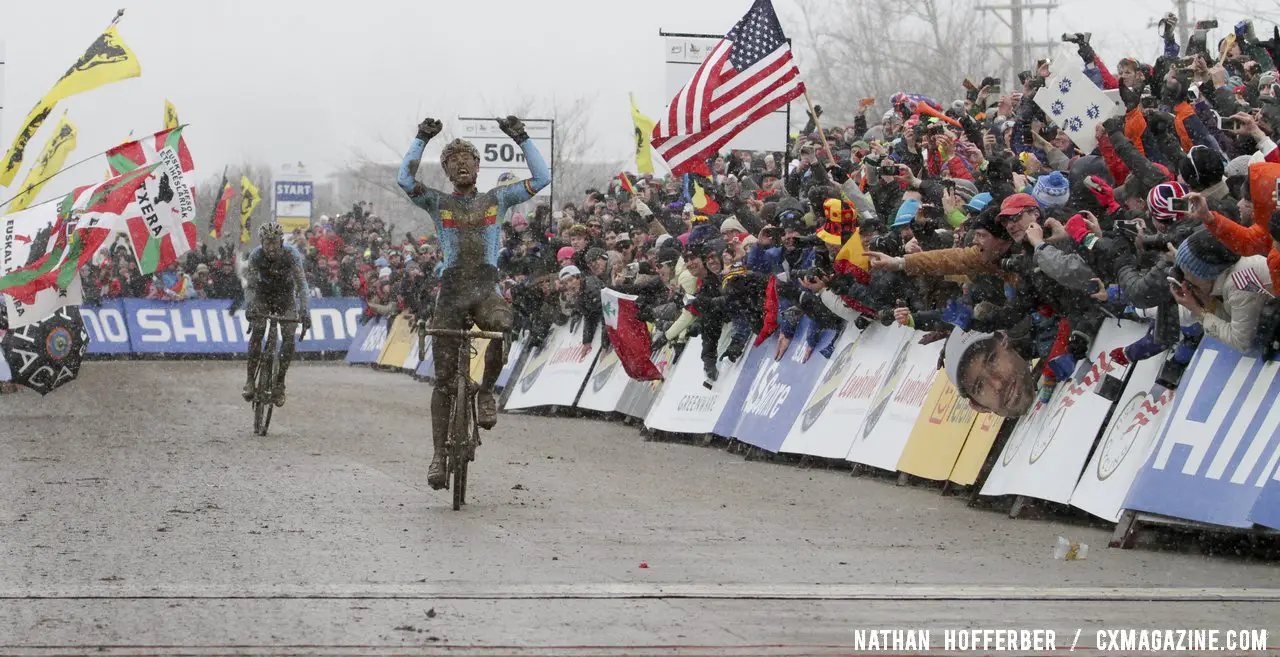
The city of Louisville was instrumental in bring the Worlds to the United States. photo: Sven Nys wins his second Elite World Championship over Klaas Vantornout in Louisville, KY. © Nathan Hofferber
As you go into that town, and I know you’ve spent some time there and talked to some folks in Louisville, that sports commission is amazing. They’re just unbelievably supportive of the cycling and cyclocross community. They really do everything they can to do things for moving our sport forward. By dedicating a park, Eva Bandman, to really forward cyclocross and to spend the money and resources they did on a world championship, to bring that for the first time to the United States, there’s a lot of history there, and I think a lot of appreciation by the cyclocross community for what they’ve done over the last many years.
We want to reward cities like that. That’s good for us as a whole, and cities like that are cities that we need relationships with to make cyclocross and cycling better. They not only give us everything we need, but the city is just very driveable from a lot of areas in the Midwest and in the East Coast.
CXM: Right.
MR: Even the parks, the metro parks [department] just bends over backward to do anything we want. We’ve surveyed, I’ve done two sites visits on that new course with Joe Creason and the director of parks, this is a guy that oversees all of the parks in the Louisville area, and he’s like, “We’ll, tell me where you want the pit, because I’m going to run a hydrant out to it in the next summer.”
CXM: Wow. That’s pretty accommodating.
MR: Or, “Hey, do you have any idea where you might do a run-up? Because we’ll go in there and build you stairs if you want them.” It’s just stuff like that, where it’s like, man, they’re so excited. They’re so easy to work with, and what they did to pull off a world championship on U.S. soil, we want to partner with people like that.
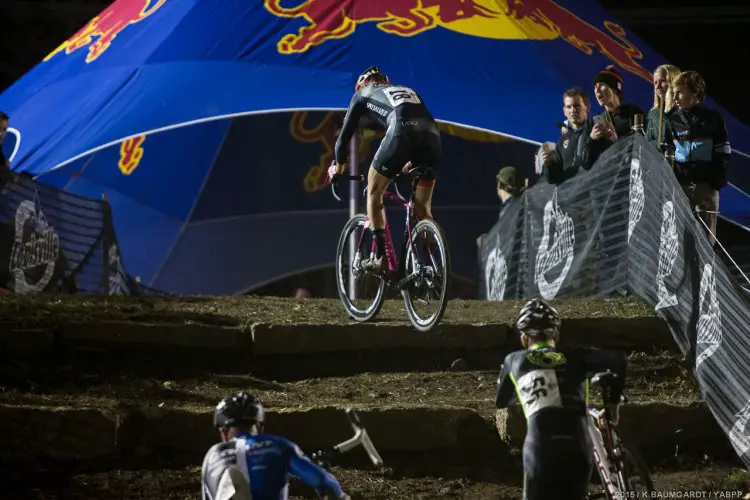
Expect tough, more man-made stairs, if USA Cycling desires, at the Joe Creason Nationals in Louisville, just as we’ve seen at Eva Bandman. photo: Cody Kaiser doing what he does, riding the huge limestone steps at Eva Bandman Park. © Kent Baumgardt
CXM: Great. Your press release quoted the cities and sports commissions, but who in terms of race promoters are behind the bids?
MR: We don’t have everything in place for that, but most likely for Louisville we’ll use Cadence Sports. Cadence is the group that runs the Derby Cup there in Louisville. They were involved in Austin National Championships.
CXM: Okay, you say probably, in that they weren’t part of the bid process?
MR: Yeah, they were a part of the bid process. They do a great job. They were part of the process. We’ve been talking to them. It’s our plan right now to use them.
CXM: Then in Tacoma, is that MFG and Zac Daab and Terry Buchanan, or is it a different group?
MR: Yeah, been working with Zac and Terry on that one. Again, we don’t have a full agreement in place with them, but we’re working on that. They’ve been instrumental in working with us. The big thing with Tacoma, first of all, the Tacoma South Sound Sports Commission with Dean Burke. He’s a big cyclist, so he races the MFG series. He’s been in the cycling industry for a while and happens to be the president of a sports commission. He worked with Zac and Terry to submit the bid. Our primary contract is with [the commission].
CXM: I see.
MR: The biggest worry we have with putting on a race in the Pacific Northwest are all of our members that are up there in Washington and Oregon that don’t have USA Cycling races to race to get their seeding better in our results and Nationals seeding.
CXM: Right. That’s one of my questions. How will you appease the locals?
MR: Yeah, so I’ll give credit to Zac and Terry. They’ve really kind of rallied the race directors up in the Washington area to work on a USA Cycling sanctioned series that will start this fall. That will be a number of races that are all USA Cycling sanctioned so that they will offer results and rankings points to be seeded for the National Championships. That’ll happen for all those people in the Pacific Northwest who are going to join us in Reno, for example. They’ll now not have to travel so much out of state to get these points. We also hope to have one or two UCI races up there. Probably not this fall, but after that.
CXM: That’ll be exciting for the area.
MR: Part of our job again, is to grow the sport and Zac and Terry are helping us create these USA Cycling races so that we can hopefully create more sanctioned races and have our members have more access to a good start to National Championships.
CXM: Makes sense. Would that also include Oregon, or is that just Washington state?
MR: I don’t know. I’m not sure how this will sort out. They’re working hard on it. I know that we talked to, I talked to a number of people in Oregon who would like to be involved, USA Cycling. I was just texting with Brad Ross, literally yesterday about stuff we’re working on.
CXM: Any chance that USA Cycling, in terms of beyond these new USA Cycling-sanctioned races, plans to offer reciprocity with OBRA or NABRA results to make that further equitable for local racers?
MR: We do not have a plan like that in place at this point. Not that that can’t happen in the next number of years. I know that Derek’s [Bouchard-Hall, CEO of USA Cycling] very interested in working, moving forward to working with OBRA as I always have been as well. I know that Derek and OBRA has talked about this and that. We don’t have a plan to change how our results and rankings work based on anything other than USA Cycling sanctioned races.
CXM: Got it. Did USA Cycling offer up any financial incentives for promoters like Zac and Terry to move their events to USA Cycling?
MR: I don’t think we really wanted to push or force them to change their current series. Obviously we’d love to use a good carrot to bring those aboard with USA Cycling, and we’d like to find a value proposition for them to sanction with us so that all of their races can be under the USA Cycling umbrella, but we want to build that value with them and not necessarily use any pushy tactics or any other reason. I do understand that Zac and Terry are going to create these USA Cycling events in addition to their MFG series. Not instead of.
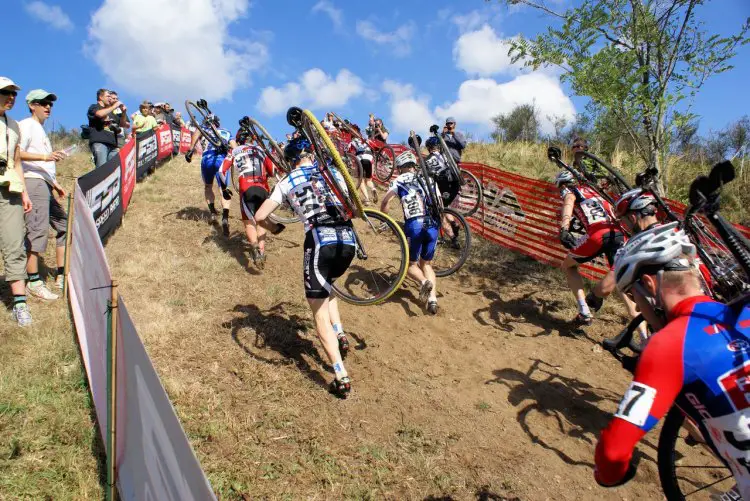
Top talent will return to Steilacoom. photo: 2009 Rad Racing GP, Ron McDonald on Flickr
CXM: Got it.
MR: They run great bike races. They really do. They do a good job up there and people really like them. We’re not here to really mess with their business structure, but I think that they’re very interested in … I think they’re very tight with the community up there. They know that the community would love to see a National Championship there, and they want to make steps to take care of their community. Their participants are also our members at the same time. There’s a lot of crossover. I think we all have the same goal, and if we can help all of our goals by placing a National Championship up there, then that’s awesome for all of us.
CXM: Got it. I agree. In terms of the December move though, did that have any impact on which cities were picked, or were those two separate decisions?
MR: They were two separate decisions, but we’ve been obviously working with these two cities to try to nail down everything and make sure that contracts were in place and all that. In the bid process from the very beginning, it was said that we might do December or January. We made it very clear to them that we weren’t sure which way it was going to go and if they wanted to continue moving forward they needed to be open to both of those options. Both of those cities were open to that, and so that worked out well.
CXM: With the next Nationals being in Reno, and then moving to Louisville, and then back to the West Coast, how important was it just to diversify in terms of the location to give people equal access in alternate years in terms of locations?
MR: We like to do that kind of thing when we can. It is on our list of things that we like to do and things that we look at when we place a national championship, for sure, but it’s not the number one or number two thing we look at. We want to make sure that we’ve got a course that’s national championship worthy, and has the infrastructure we need to run a successful national championship. That’s first and foremost. Then we look at how everyone benefits from that, whether that be the city benefiting from heads and beds, USA Cycling not losing a pile of money on it, or however else it goes. We want to make sure that it is a successful event financially for everyone, and we try to make sure it is.
I think I’ve probably told you this before. I don’t, in my tenure here at USA Cycling, I don’t think we’ve ever made money on a cyclocross national championship. I think we’ve always been in the red.
CXM: That would surprise some Internet commenters.
MR: I think our job again, our mission is to grow the sport. I’ll tell you this, dropping $35,000 on a really good, live feed to show off the National Championships does not pay off. There is no good way to offset that cost. We’ve tried to put a big screen near the start finish for everybody on site to enjoy and watch. That is four grand that you’ll never see again. That’s what we do as a governing body. Our job, we don’t have to break even as long as we’re growing the sport. That’s one of the reasons why we run these national championships how we want to run them. If we left it to a promoter who has got to make money, then they’re just going to cut corners, completely legitimately. If it was my profit and loss personally, and I was not going to pay the rent if I lost money on Cyclocross Nationals, then of course I’d cut corners.
“I don’t think we’ve ever made money on a cyclocross national championship. I think we’ve always been in the red.”
CXM: Right.
MR: That’s what all good business people would do. Fortunately we at USA Cycling are in a position where if we need, if we have a good reason to lose money on the event, then we have the luxury of doing that. We do not make money on Cyclocross National Championships. We have not.
CXM: We’re intimately familiar with losing money on covering many Cyclocross National Championships, for sure. It just needs to be done, right?
MR: Yeah. No, it’s, again, it’s, for example our Cyclocross National Championships YouTube web stream, we got 100,000 hits on that faster than any video we’ve put up on YouTube, ever, at USA Cycling. It’s not just our members who are watching that. It’s a lot of people who are like, “You know, that looks pretty cool. I might go buy a ’cross bike, or I might take my mountain bike next fall and go out and try one of those, because I know there’s one down the street.” Those are the people that we’re trying to reach with that [money] spent on the livestream. Otherwise we’re just talking to ourselves, right?
“If we left it to a promoter who has got to make money, then they’re just going to cut corners, completely legitimately. If it was my profit and loss personally, and I was not going to pay the rent if I lost money on Cyclocross Nationals, then of course I’d cut corners.”
CXM: Totally. Some high profile companies and some high-profile events have been boycotting Utah because of public land issues, and it’s gotten a lot of press. I was wondering if that played any factor into not going with Ogden.
MR: No, it did not. That was not a decision maker for us. The Ogden folks are awesome. We love the people at Ogden. Visit Ogden is a really well run convention of visitors bureau. Love the folks over there, they do a great job. It’s a cool town. They’ve got a good venue, but it just, it didn’t offer as much in terms of meeting our vision and mission as these other two did.
CXM: Got it. As for Hartford, [it] charged a gate fee for spectators to come in and participants to come in, and it was a one-time fee. I was wondering if, now that it’s a couple months past the event, was that a success?
MR: The Biltmore also did that in Asheville. That was a similar deal. It was $15 plus tax to get in for the week, so a little over 16 bucks per person. It’s hard. I think it’s always difficult for people who have been getting something free for so long to turn around and spend money on it. I completely get that. If I was rolling up to the gas pump and filling up my car every week for free, and then all of the sudden someone wanted to charge me two bucks a gallon, I’d just be like, “What the heck?”
It’s about value. Is it worth 15 bucks for you to go and hang out and watch some of the top racers, definitely the top racers in the United States, but the top racers in the world, to come be part of it? If it’s not worth it, and then we can’t charge, and again, it was the LSC [local sports commission] that was charging. We didn’t actually collect any of that money that was … none of that went to us. The LSC had to make sure that the park was paid for. That park was a lot of money, a lot of money. It’s probably the most expensive venue that we’ve had for a national championship, easily.
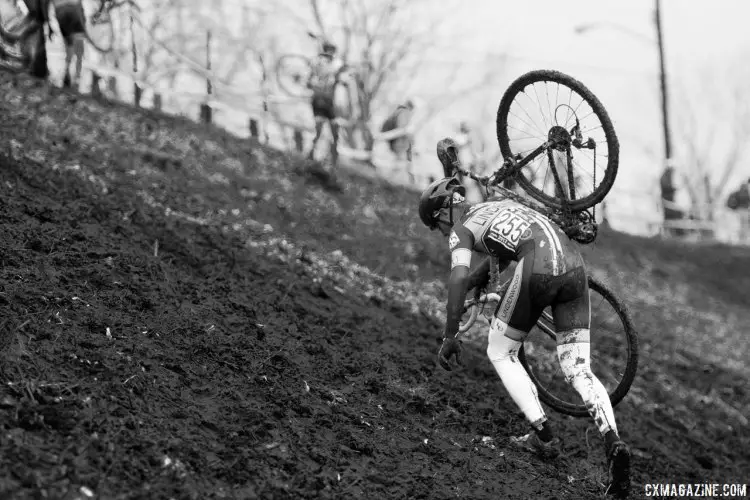
Riverfront Park in Hartford challenged not only the racers with its long run-up, but the organizers as it was the most expensive Cyclocross Nationals venue USA Cycling has used. photo: Collegiate Men Varsity race – Hartford, CT. © A. Yee / Cyclocross Magazine
CXM: Oh wow. I didn’t realize that.
MR: Yeah, and if we want to continue to go into urban areas where we’re right next to a large downtown with great access to a city and all its amenities and walk or ride your bike from 10 different hotels, and be right there in the mix where people can easily get to that race, then it’s going to cost somebody some money somewhere. Otherwise we can stop charging parking and we can stop charging a gate fee, and we can run all of our national championships in a cornfield somewhere in Kansas, because I can get a cornfield in Kansas really damn cheap and we don’t have to charge anybody anything.
CXM: Sure.
MR: Spectators will be solidly down. There will no one really watching and hanging out. People are going to have to drive 30 minutes to go back to their hotel, at best. Not a big deal, right? I don’t think that’s where this sport needs to go. I think this sport needs to grow and needs to be accessible to fair weather fans. It can’t be just the hardcore racers who are very willing to show up in a cornfield in Kansas to participate in their National Championships. If people want that sort of event, then we’ve got to find ways to pay for it.
“…I can get a cornfield in Kansas really damn cheap and we don’t have to charge anybody anything.”
CXM: Do you have final spectator and participant numbers from Hartford? Can you share those?
MR: I don’t. I do know that we were down right around 100 participants, roughly 1,800 to roughly 1,700. We expected that, just knowing a couple of things. We knew that the Northeast would be strong, as they always are for cyclocross, but we also knew that the cold would scare off people that weren’t used to the cold and probably just skip it.
We also knew that as a city, Hartford isn’t as much of a destination trip like Asheville or Austin or Boulder. I think we’ve got good numbers from people who are like, “Ah, Austin sounds awesome. I’ve never been there. I’ve heard about it. I want to go.” Very few people are like, “Ah, Hartford, Connecticut. I’ve been wanting to go to Hartford, Connecticut.” It’s nothing against Hartford. Honestly, they’ve got some really good food in that city and there’s a lot going on. I think Hartford has done a really good job of starting to recreate themselves, actually. I think it’s actually, there’s some really cool stuff going on in that town, but it’s not quite as well known as some of our earlier venues.
CXM: Any spectator estimates though? Based on the final day or anything like that?
MR: We’re waiting on the numbers. I don’t actually have those.
I think again, it’s down a little bit from Asheville. I would think that, I think that they were probably down a little bit from the final day in Asheville, but pretty dang close. We estimated our final day in Asheville to be around 3,000.
CXM: Yeah, if anyone has those numbers or eventually you’ll get them, we would love to see them. I ask though, because having lived in New England and this being the first Cyclocross Nationals in New England in a long time, I was disappointed with the final day spectator crowds. I know there was a storm the day before, but I expected much bigger crowds and I wasn’t sure whether it was just the weather or the time of year, or even just the gate fees. New England is such a hub for cyclocross and the two biggest stars are from there on the men’s side. I just expected bigger crowds.
MR: Yeah, I was definitely hoping for more. I was a little disappointed that New England didn’t truly show up in a big way like they said they were going to, but I think it was, I don’t think that the numbers were dismal. I mean I didn’t expect as many people just because I knew it was, as you said, a storm and it was a cold day. I was hoping more people would come, but many decided to stay in their home and watch the live stream.
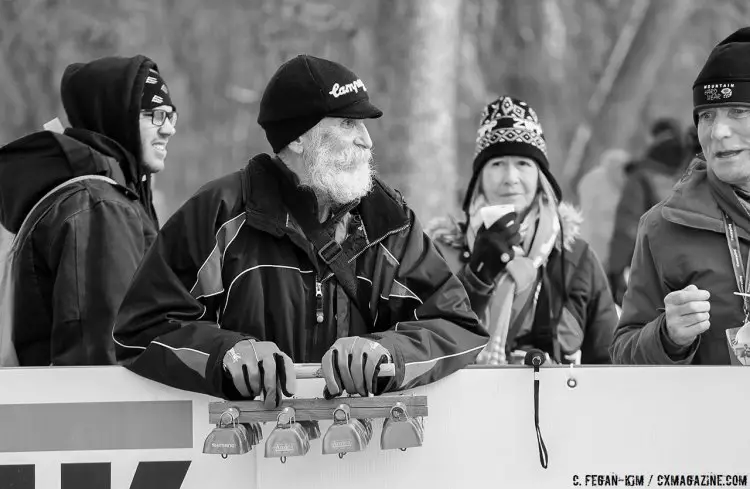
Spectator numbers may have been light in Hartford, but this guy made up for it with more cowbells. 2017 Cyclocross National Championship. © C. Fegan-Kim / Cyclocross Magazine
CXM: Right. I know it’s real tough balance to make the numbers work and also try to expose as many people to the sport as possible and grow the sport, but just my observation would be that if you’ve got a family of four with two kids and maybe you’ve got to buy each of them a bracelet because they’re teenagers or something, $60 to check out something you’re somewhat curious about could scare off somebody as they have other options. They could take their family to the movies at that rate. To really bring in more casual curious spectators, I do think that free is obviously more attractive, and I’m curious whether Louisville or Tacoma, or even Reno, actually, whether there are plans to continue that facility fee.
MR: It depends on what the LSC needs to do to continue on and make sure that they’ve got a lot of their stuff covered. It is our expectation right now, and please don’t hold me to this, because we haven’t finalized it, but it’s my expectation right now that there won’t be an entry fee, but there will be a parking fee in Reno.
CXM: Got it. Is that a factor in deciding a venue and a bid, even for Louisville and Tacoma, whether somebody will have to pay just to check out something that they’re curious about?
MR: It’s something that we take in and factor, yes, but it’s one of many.
CXM: Sure. One last question about Louisville, and that’s when I saw the announcement I was like, “Oh, okay. We’re going back to Eva Bandman,” and then all of the sudden I see something about a new venue. I was curious about the rationale behind that and whether the likelihood of another flood, or just trying to prevent such an act of Mother Nature, was the reason to choose another venue?
MR: That is something that in [its] bid Louisville came to us with…was this new venue. It’s not something that we pushed.
I will say, obviously I’ve spent many times and many hours at Eva Bandman personally. I know that venue quite well and I know what it’s great about, and I know what its real limiting factors are. I can say that Joe Creason is going to be a really good venue and actually has some strengths that Eva Bandman does not. It’s got a lot more, we’ve got a lot more ability to make some tougher hills and climbs. We’re going to get some more undulation in that course. There’s some tough hills. There’s a whole bowl that we can come in and out of on both sides of the lap that are going to really make for a hard course. I think they’ve done a really good job, Keegan and everybody [who has put on] a race there, even back to Joan [Hanscom] and Bruce [Fina] for USGP. They did a great job of using the one hill that exists at Eva Bandman and really working the heck out of it to maximize the…
CXM: The ups and downs?
MR: The elevation change, but it’s going to be easy to make people hurt over at Joe Creason. I think there’s some really good, there’s good infrastructure there, too. There’s good Internet. There’s places for a media room that’s inside. There’s really good parking because it’s next to the zoo and we can use the zoo parking. There’s also really good areas for team parking and expo and stuff like that. I think that there’s some real strengths there at Joe Creason that we don’t have at Eva. I think people are excited to try out a new course in Louisville. We’re going to use the Pan Am Championships on that course this fall.
“…it’s going to be easy to make people hurt over at Joe Creason”
CXM: That was my next question, yeah, there will be a test event?
MR: Yeah, they’re actually going to use Joe Creason Park this fall for the Pan Am Championships to test it for Nationals.
CXM: Test events seem to have a lot of value, whether it’s used to prevent issues experienced in Austin or the World Championships in Bieles this past year.
MR: Yeah, it’s good to have those. The level of test event is a little bit different. We didn’t have a big test event in Hartford. Hartford was great. It was a great course, and we didn’t really have a lot of problems with it. It’s all about preparation and knowing what that course might look like, and making sure that you can do that. There were cyclocross races run on that piece of property, but as USA Cycling, we never came in and ran a test event on Hartford.
CXM: Is that an official policy, though, saying there has to be some cyclocross race at this venue before the Nationals land?
MR: It’s not an official policy. We do look at that in the bid package to know, are we going to have to, what kind of work are we going to have to put into this piece of land to know how to lay this down. The thing in Austin was just out of left field. No one could have figured that out. Even if we run a little test event there, it might not have been noticed by the tree people. I don’t think we could ever look at Austin and say, “Oh, everything would have been fine if we’d just done a test event.” No, no. No one saw this one coming.
Then you look at Hartford. It’s like, yeah, they had, someone had done some cyclocross races there so the park staff understood it, but [it was] a completely new course. No one had really done [that course ] there at Nationals and it worked great. It was a great course. A lot of people were talking about how great it was.
“Hartford was great. It was a great course, and we didn’t really have a lot of problems with it… A lot of people were talking about how great it was.”
The next two though, we’ll have some really good test events. A UCI event, obviously this fall, which will really put it through the ringer and then in Tacoma at Steilacoom Park. There [was an] old USGP on that site, as well as MFG does a race there every year that, with 500 people a day, or more than that. I think it’s closer to a 1,000 people run there on a weekend.
I think that test events are good, and they save time and effort on our part. We like to see test events. We do push for test events, but it’s not a deal breaker.
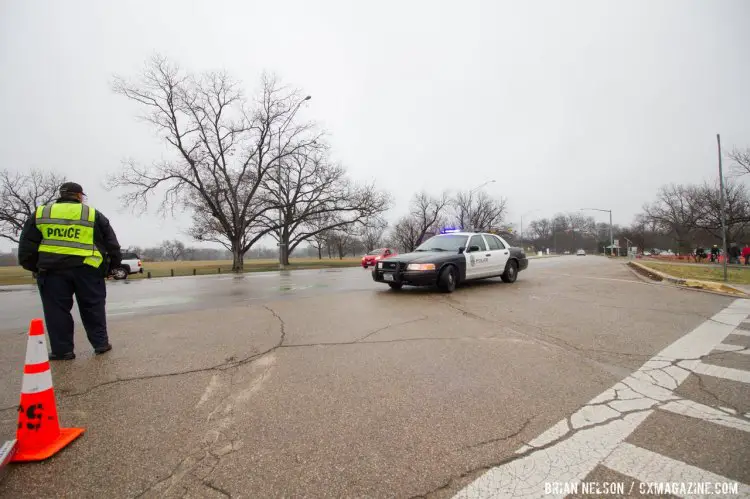
A test event may not have helped prevent the Austin Nationals fiasco. photo: The Austin Police Department arrived and promptly closed the park after complaints were received about damage to the heritage trees. © Brian Nelson / Cyclocross Magazine
CXM: Okay, great. My last question, what’s your thoughts on the state of ’cross in the US?
MR: The state of ’cross. I think we’ve started to see racer days plateau and start to go down slightly. I think all of cycling is doing that right now. I don’t think it’s just cyclocross. I think it’s true across all of the disciplines. I think it’s, you talk to, it’s the same with races that haven’t been USAC sanctioned. Look at Cross Crusade, or OBRA. They’re having some similar issues.
CXM: Right.
MR: It’s not just USA Cycling stuff. I think there’s some bright spots in bicycling racing, for sure. You’ve seen a rise of gravel grinders and grand fondos. A little bit more of a recreational side of things picking up, not traditional racing. You see those things picking up. You see enduros for examples on the mountain bike side getting more popular. It’s just a little bit more of a pure why-we-ride-mountain-bikes kind of thing. We sort of like to hurt yourselves on the uphills, but we ride the uphill so we can ride down the hill.
CXM: Right.
MR: On the mountain bike, on the singletrack because it’s so fun. I think we’re seeing a little bit more of that recreational side, which we look at as an opportunity to start really bringing in more recreational riders to the racing or more competitive side. We’re really pushing hard on is our Ride Membership and getting down to that next layer of people who ride their bikes and might be interested in a competitive event, but they’re not ready to throw themselves into the local parking lot crit.
CXM: High school mountain bike racing has to be a real bright spot, too, right?
MR: Yeah.
CXM: It’s not USA Cycling, but that’s got to feed the funnel.
MR: It does, and we’re actually sanctioning more mountain bike racing now than we have in the last couple of years. We’re seeing more of those groups come on and some people see value in sanction with USA Cycling, and some don’t. Our thought process on it is please make sure that you have good insurance so that you’re not putting any of our members or people that want to participate in the sport, make sure they’ve got, even if they get hurt, they’ve got a good thing to fall back and we don’t want any race directors to go out, to lose their house or anything like that.
CXM: Right, makes sense.
MR: My thought process is anyone on a bike who is even in racing their bike, whether it’s sanctioned or not, that’s good for all of us.
It’s obviously part of the equation. Sure, we’d like to bring on more races so we can put everyone under the umbrella and make sure that we’ve got one really well-run ecosystem and help out, but we understand that some people don’t see the value in USA Cycling, and as long as they’re being safe and everyone’s having a good time, I think that’s awesome.
CXM: Great. You’ve been super generous with your time. Louisville and Tacoma, they’re great locations, got some history, and you can count on us being there.
MR: Awesome. We’ll see you there.


